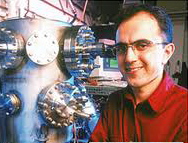NSF Grants $300K to Develop Nano Electrodes
Dr. Tansel Karabacak, assistant professor of applied science, and his group of researchers have received a $300,000 National Science Foundation grant aimed at helping develop a new generation of fuel cells that are environmentally friendly.
A fuel cell is a device that converts the chemical energy from fuel into electricity through a chemical reaction with oxygen or another oxidizing agent. Hydrogen is the most common fuel; natural gas and such alcohols as methanol are sometimes used.
 Karabacak’s team is working to develop advanced nanostructured catalyst materials for next generation polymer electrolyte membrane (PEM) fuel cell electrodes. The NSF grant will support the project over a three-year period.
Karabacak’s team is working to develop advanced nanostructured catalyst materials for next generation polymer electrolyte membrane (PEM) fuel cell electrodes. The NSF grant will support the project over a three-year period.
“PEM fuel cell technology stands without precedent as one of the most promising alternative energy systems for an environmentally friendly, sustainable energy economy,” Karabacak said.
PEM fuel cells can operate with various types of energy carriers including hydrogen, ethanol, and methanol. But conventional PEM fuel cell electrodes – composed of carbon-supported platinum catalyst nanoparticles – have several key limitations.
To overcome these limitations of the traditional cathode catalyst, Karabacak proposes to employ a new nanostructured PEM fuel cell electrode design made up of single layer carbon-free catalyst nanorod arrays for enhanced electrochemical activity.
Karabacak will use a combination of recently developed small angle deposition and glancing angle deposition techniques for the fabrication of the nanorod PEM fuel cell electrodes.
The electro-catalysis characterization and fuel cell performance tests will be done in conjunction with Dr. Deborah Myers, leader of the Hydrogen and Fuel Cells Materials Group at the Argonne National Laboratory, who is working on improving the durability and lowering the cost of fuel cell power and hydrogen production systems.
Argonne, located outside of Chicago, is one of the U.S. Department of Energy’s largest national laboratories for scientific and engineering research.
More information on the award can be found at National Science Foundation site.